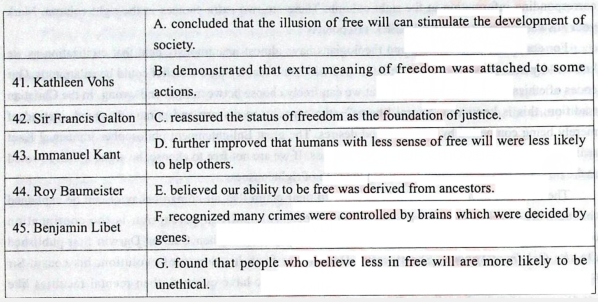单选题
For centuries,philosophers and theologians have almost unanimously held that civilization as we know it depends on a widespread beliefin free will-and that losing this beliefcould be calamitous.Our codes of ethics,for example,assume that we can freely choose between right and wrong.In the Christian tradition,this is known as"moral liberty"-the capacity to discern and pursue the good,instead of merely being compelled by appetites and desires.The great Enlightenment philosopher Immanuel Kant reaffirmed this link between freedom and goodness.Ifwe are not free to choose,he argued,then it would make no sense to say we ought to choose the path of righteousness.The sciences have grown steadily bolder in their claim that all human behavior can be explained through the clockwork laws of cause and effect.This shift in perception is the continuation of an intellectual revolution that began about 150 years ago,when Charles Darwin first published On the Origin of Species.Shortly after Darwin put forth his theory of evolution,his cousin Sir Francis Gakon began to draw out the implications:If we have evolved,then mental faculties like intelligence must be hereditary.But we use those faculties-which some people have to a greater degree than others-to make decisions.So our ability to choose our fate is not free,but depends on our biological inheritance.Many scientists say that the American physiologist Benjamin Libet demonstrated in the 1980s that we have no free will.It was already known that electrical activity builds up in a person"s brain before she,for example,moves her hand;Libet showed that this buildup occurs before the person consciously makes a decision to move.The conscious experience of deciding to act,which we usually associate with free will,appears to be an add-on,a post hoc reconstruction of events that occurs after the brain has already set the act in motion.In 2002,two psychologists had a simple but brilliant idea:Instead of speculating about what might happen if people lost belief in their capacity to choose,they could run an experiment to find out.Kathleen Vohs,then at the University of Utah,and Jonathan Schooler,of the University of Pittsburgh,asked one group of participants to read a passage arguing that free will was an illusion,and another group to read a passage that was neutral on the topic.Then they subjected the members ofeach group to a variety of temptations and observed their behavior.Would differences in abstract philosophical beliefs influence people"s decisions?Yes,indeed.When asked to take a math test,with cheating made easy,the group primed to see free will as illusory proved more likely to take an illicit peek at the answers.When given an opportunity to steal-to take more money than they were due from an envelope of$1 coins-those whose beliefin free will had been undermined pilfered more.On a range of measures,Vohs told me,she and Schooler found that"people who are induced to believe less in free will are more likely to behave immorally."Another pioneer of research into the psychology of free will,Roy Baumeister of Florida State University,has extended these findings.For example,he and colleagues found that students with a weaker belief in free will were less likely to volunteer their time to help a classmate than were those whose belief in free will was stronger.Likewise,those primed to hold a deterministic view by reading statements like"Science has demoiistrated that free will is an illusion"were less likely to give money to a homeless person or lend someone a cellphone.
 Sir Francis Galton?
Sir Francis Galton?
 Sir Francis Galton?
Sir Francis Galton?Aconcluded that the illusion of free will can stimulate the development of society
Bdemonstrated that extra meaning of freedom was attached to some actions
Creassured the status of freedom as the foundation of justice.
Dfurther improved that humans with less sense of free will were less likely to help others.
Ebelieved our ability to be free was derived from ancestors.
Frecognized many crimes were controlled by brains which were decided by genes
Gfound that people who believe less in free will are more likely to be unethical
正确答案
答案解析
根据Sir Francis Galton定位到第二段。Sir Francis Galton的观点是:our ability to choose our fate is not free,but depends on our biological inheritance(我们选择自己命运的能力并不是自由的,而是取决于我们的生物遗传)。E项derived from ancestors(从祖先那里继承)是相似的意思,故E项为正确选项。